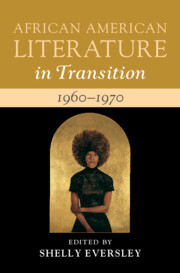Book contents
- African American Literature in Transition, 1960–1970
- African American Literature In Transition
- African American Literature in Transition, 1960–1970
- Copyright page
- Contents
- Contributors
- Preface
- Acknowledgments
- Chronology
- Introduction
- I Poetry and Music
- II Culture and Politics
- Chapter 5 The Rights of Black Love
- Chapter 6 Albert Murray Beyond Plight and Blight
- Chapter 7 Espionage and Paths of Black Radicalism
- Chapter 8 The Necessary Violence of Frantz Fanon and Malcolm X in Global Black Revolution
- III Beyond the Canon
- Index
- References
Chapter 7 - Espionage and Paths of Black Radicalism
from II - Culture and Politics
Published online by Cambridge University Press: 10 November 2022
- African American Literature in Transition, 1960–1970
- African American Literature In Transition
- African American Literature in Transition, 1960–1970
- Copyright page
- Contents
- Contributors
- Preface
- Acknowledgments
- Chronology
- Introduction
- I Poetry and Music
- II Culture and Politics
- Chapter 5 The Rights of Black Love
- Chapter 6 Albert Murray Beyond Plight and Blight
- Chapter 7 Espionage and Paths of Black Radicalism
- Chapter 8 The Necessary Violence of Frantz Fanon and Malcolm X in Global Black Revolution
- III Beyond the Canon
- Index
- References
Summary
This chapter provides an assessment of the shifting terrain of 1960s-era political radicalism through an analysis of Sam Greenlee’s novel The Spook Who Sat by the Door (1969/1973). It argues that the novel employs and challenges recognizable Civil Rights and Black Power discourses of social change to destabilize institutionalized racism and socio-economic discrimination and to begin to imagine untested paths to resistance. The chapter also considers how Greenlee uses espionage to reconfigure familiar political ideals and modes of leadership and to explore how the imagined integration of the CIA becomes a device for critiquing employment discrimination and the state’s half-hearted deployment of affirmative action. It closes by showing how spy training and spycraft offer Greenlee opportunities to rethink the connections among gender, sexuality, and revolution, while additionally illustrating how heterosexual masculinity dominates the space of the revolutionary. Through the frame of espionage, Greenlee reimagines Black identity and activism.
Keywords
- Type
- Chapter
- Information
- African American Literature in Transition, 1960–1970Black Art, Politics, and Aesthetics, pp. 173 - 198Publisher: Cambridge University PressPrint publication year: 2022

